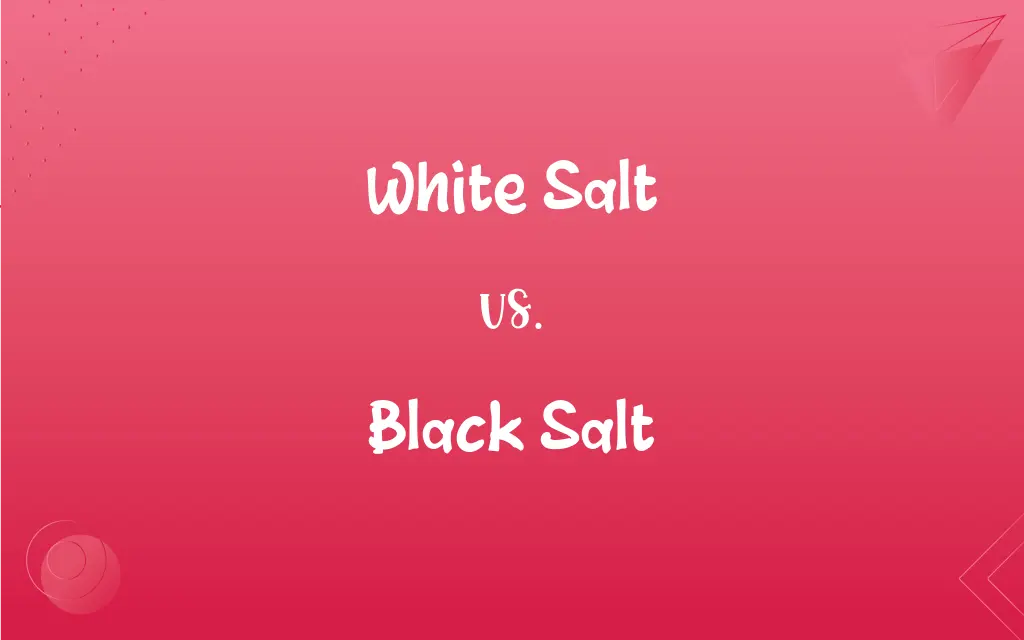White Salt vs. Black Salt: What's the Difference?
Edited by Aimie Carlson || By Janet White || Published on December 18, 2023
White salt is refined and common in cooking; black salt, often Himalayan, is unrefined with a sulfurous aroma, used in South Asian cuisine.

Key Differences
White salt, commonly known as table salt, is refined and often iodized for health benefits. It's the most widely used salt in cooking. In contrast, black salt, particularly Himalayan black salt, is unrefined and contains a unique blend of minerals and iron. This gives it a distinct taste and color, differentiating it from regular white salt.
In terms of flavor, white salt has a straightforward salty taste and is a staple in various cuisines worldwide. On the other hand, black salt is known for its pungent, sulfuric smell and taste, often compared to boiled eggs. This unique flavor profile makes black salt a specialty ingredient in certain dishes, particularly in South Asian cooking.
Nutritionally, white salt primarily consists of sodium chloride and sometimes iodine. This composition makes it essential for daily dietary needs but also a concern for those monitoring sodium intake. Black salt, however, contains trace minerals and less sodium, which can offer a different nutritional profile.
The use of white salt is universal, from seasoning to preservation. Black salt, while also used in cooking, finds a specific place in vegan cooking as a flavor enhancer and is a staple in Ayurvedic medicine due to its perceived health benefits.
The appearance of these salts is a clear differentiator. White salt is fine and granulated with a pure white color. Black salt, despite its name, is actually a pinkish-brown color due to the presence of iron and other minerals, giving it a distinct look compared to the common white salt.
ADVERTISEMENT
Comparison Chart
Origin
Refined from sea or rock sources.
Unrefined, often from Himalayan sources.
Flavor
Pure, salty taste.
Sulfurous, slightly tangy taste.
Use in Cuisine
Universal in various cuisines.
Common in South Asian cuisine, vegan dishes.
Nutritional Content
High in sodium, sometimes iodized.
Contains trace minerals, lower in sodium.
Physical Appearance
Fine, white granules.
Pinkish-brown crystals.
ADVERTISEMENT
White Salt and Black Salt Definitions
White Salt
White salt is soluble in water and commonly used in cooking and baking.
She dissolved white salt in water to brine the chicken.
Black Salt
Black salt, often Himalayan, is an unrefined mineral with a distinct sulfurous aroma.
The black salt gave the vegan eggs a surprisingly eggy flavor.
White Salt
White salt often contains added iodine, used to prevent iodine deficiency.
The iodized white salt in our kitchen helps meet our daily iodine needs.
Black Salt
Black salt is used in Ayurvedic medicine for its therapeutic properties.
He used black salt in his diet as recommended in Ayurvedic practices.
White Salt
White salt is known for its ability to draw out moisture from ingredients.
White salt was used to cure the meat, drawing out excess moisture.
Black Salt
Black salt contains trace minerals, contributing to its pinkish-brown color.
The black salt's color comes from the minerals found in the Himalayan foothills.
White Salt
White salt is a refined, granulated mineral primarily used for seasoning and preserving food.
I added white salt to the soup to enhance its flavor.
Black Salt
Black salt is a key ingredient in South Asian cuisines, known for its unique flavor.
Black salt is essential for the authentic taste of this traditional Indian chaat.
White Salt
White salt is often used as a finishing touch to dishes, enhancing their flavor.
A pinch of white salt was all it took to perfect the dish.
Black Salt
Black salt is often used in vegan cooking to mimic the flavor of eggs.
Adding black salt to tofu scrambles creates an egg-like taste.
FAQs
Where is black salt sourced from?
Black salt is primarily sourced from Himalayan deposits and other salt mines in South Asia.
Is black salt healthier than white salt?
Black salt contains fewer additives and more trace minerals, but both should be consumed in moderation.
What is black salt?
Black salt is a type of unrefined mineral salt with a distinct sulfurous flavor, often used in South Asian cuisine.
Is white salt iodized?
Yes, white salt is often iodized for nutritional benefits.
Does black salt taste like regular salt?
No, it has a distinct sulfurous, tangy taste.
What is white salt?
White salt is refined salt, commonly used in cooking and seasoning.
What dishes are best with black salt?
Black salt is great in vegan dishes, chaats, and traditional South Asian foods.
Why is black salt pinkish-brown?
The color comes from iron oxide and other minerals in the salt.
Is white salt good for preservation?
Yes, it's excellent for curing and preserving food.
Is white salt natural?
White salt is natural but heavily processed and refined.
Is white salt vegan?
Yes, white salt is vegan and does not contain animal products.
Is black salt expensive?
It can be more expensive than white salt, depending on the region.
Can black salt be used in baking?
It's not commonly used in baking due to its strong flavor.
Can I use black salt for daily cooking?
Yes, but it's more commonly used in specific dishes due to its strong flavor.
Can white salt replace black salt in recipes?
While white salt can be used as a substitute, it lacks the unique flavor of black salt.
What makes black salt unique in Ayurveda?
It's believed to have cooling properties and aids in digestion.
Does white salt have any minerals?
Apart from sodium and chloride, it has few minerals due to processing.
Can I use black salt in sweet dishes?
Its distinct flavor is generally not suitable for sweet dishes.
Can black salt help in weight loss?
There's no scientific evidence to support this claim.
How should I store white salt?
In a dry, airtight container to prevent clumping.
About Author
Written by
Janet WhiteJanet White has been an esteemed writer and blogger for Difference Wiki. Holding a Master's degree in Science and Medical Journalism from the prestigious Boston University, she has consistently demonstrated her expertise and passion for her field. When she's not immersed in her work, Janet relishes her time exercising, delving into a good book, and cherishing moments with friends and family.
Edited by
Aimie CarlsonAimie Carlson, holding a master's degree in English literature, is a fervent English language enthusiast. She lends her writing talents to Difference Wiki, a prominent website that specializes in comparisons, offering readers insightful analyses that both captivate and inform.































































